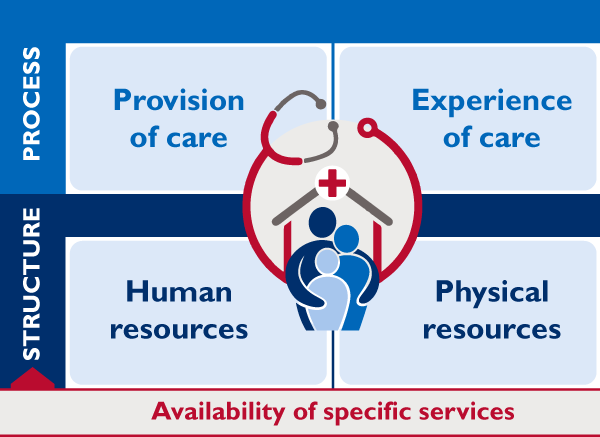SPA Overview
The Service Provision Assessment (SPA) is a health facility survey that collects information on service availability and Quality of Care (QoC) measures within a country’s health system. SPAs fill an urgent need for actionable monitoring data in participating countries. The SPA assesses availability and QoC for a wide variety of services with a focus on antenatal care (ANC), family planning (FP), maternity care, and sick child services. Quality of Care measures include indicators in two dimensions: structural quality (physical and human resources) and process quality (provision of care and experience of care).

The SPA was redesigned in 2022 in collaboration with technical experts, representatives from WHO, UNICEF, Ministries of Health, and others, to make the SPA indicator-driven and refocused on QoC.
Key services and topics assessed in the SPA include:
- Child Health: Availability of childhood vaccines, medicines, and nutritional supplements; equipment and supplies for outpatient care, growth monitoring and nutrition assessment; adherence to guidelines for care of sick children; assessment and treatment of acute malnutrition; client experience of care.
- Antenatal Care: Availability of equipment, medicines, and supplies; appropriate assessment of clients for antenatal care; client experience of care.
- Delivery and Newborn Care: Availability of equipment, medicines and supplies, delivery services; newborn care including assessment of resuscitation skills through simulation; early postpartum counseling for mother and newborn; client experience of care.
- Family Planning: Availability of contraceptives and supplies; counseling and client assessment; provision of STI treatment for family planning clients; client experience of care.
- Malaria: Availability of malaria diagnosis and treatment equipment, medicines, and supplies; laboratory diagnostic capacity; rapid diagnostic testing; adherence to guidelines for sick children diagnosed with fever or malaria; caretaker experience of care.
- Nutrition: Availability of growth monitoring and nutritional screening for children; availability of nutrition-related equipment, medicines, nutritional supplements, and supplies; appropriate nutritional messages; counseling during pregnancy; prevention of mother to child transmission (PMTCT); newborn services; sick child services.
- Health System Strengthening: HMIS, management meetings, client opinion and feedback, quality management activities like audit or mortality review, external supervision, professional development, quality improvement.
- Water, Sanitation, and Hygiene (WASH): Availability of improved water source; infection prevention and control (IPC); waste management; basic sanitation services including specific types of toilets.
- Emergency Preparedness*: Availability of emergency services 24 hours a day; emergency plans; stockpile of essential medicines set aside for any emergency observed.
- Gender-Based Violence*: Availability of gender-based violence care services.
- HIV/AIDS: Availability of HIV counseling and testing services; HIV/AIDS care and treatment services; antiretroviral treatment; PMTCT; post-exposure prophylaxis; voluntary medical male circumcision; nutrition assessment, counseling, and support (NACS) services.
- Non-Communicable Diseases: Availability of diagnosis and treatment services for diabetes, cardiovascular, and chronic respiratory diseases; availability of medicines, guidelines, basic supplies, and equipment.
- Post-Abortion Care*: Availability of post-abortion care services.
- Primary Health Care: Availability of basic services, basic equipment, essential drugs, and supplies.
- Reproductive Cancers*: Availability of breast cancer and cervical cancer screening services.
- Sexually Transmitted Infections (STIs): Diagnosis and treatment of STIs other than HIV; referrals for HIV counseling and testing; availability of STI guidelines.
- Tuberculosis: Availability of TB diagnostic and treatment services.
*New in revised SPA